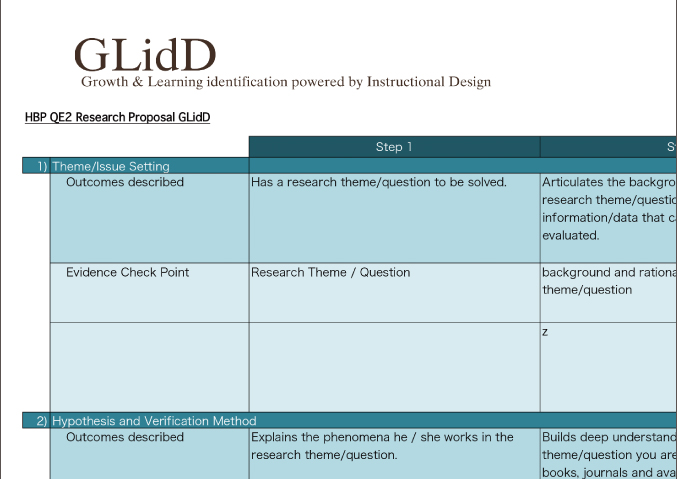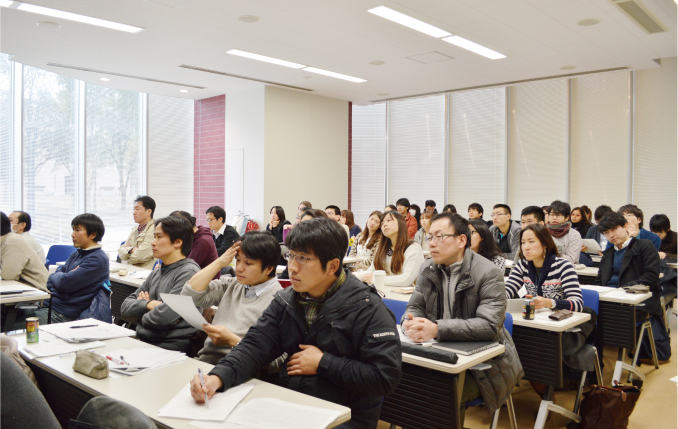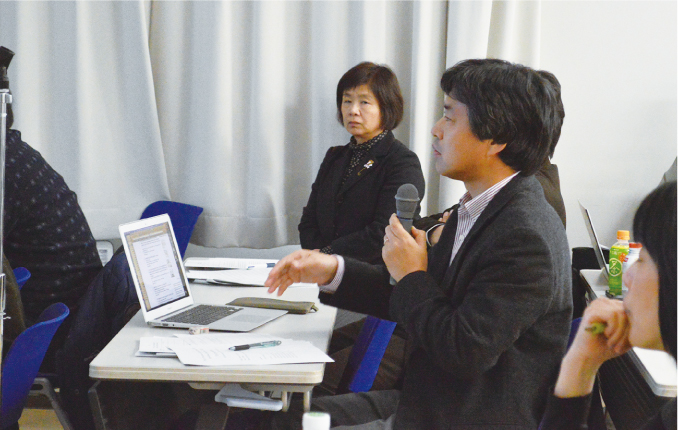Something we had not dealt with before
Since there was no Qualifying Examination (QE) course in existing graduate schools, we did not know what to do at the time of the launch of the program. Therefore, many of the rules of QE were decided after the program began.
At first, QE 2, which is a necessary examination for completing the program, was proposed as a mid-term examination report meeting or research presentation at training camp; however, this idea was not accepted, and we had to renegotiate. At the same time, we were also discussing how to output and visualize students’ progress in their learning outcomes. As a result of the discussion on the evaluation of QE 2 and the visualization of student learning outcomes, the idea of introducing GLidD’s external expertise was born.
I think it was the right decision to use GLidD to evaluate QE 2 proposals. In short, QE 2 proposal GLidD was created to evaluate QE 2 proposals by applying the evidence-based objective evaluation method that GLidD expertise offers. This mechanism is used to eliminate the ambiguity in QE 2 proposal evaluations by faculty members and to evaluate them objectively.
Although we had experience in evaluating dissertation theses, evaluating the QE 2 proposal was difficult since it consisted of a project proposal form, which was a new initiative for us. Also, we did not have any standards for the evaluation initially. In other words, this was not something we had dealt with before, so we could not evaluate it. This was one of the issues we had to resolve while running the program.

QE2 Proposal GLidD
[ Qualifying Examination (QE) ]
Qualifying Examination (QE) existing in 5-year Ph.D. program in U.S. is to holistically assess the knowledge and capabilities required for doctoral researches. It was also required to have such quality assessment process in this newly developed program.
Students will take the QE1 in the 2nd year and QE2 in 5th year. In QE1, HBP evaluates a clear determination to contribute to the world on top of required knowledge and abilities. In QE2, HBP evaluates students according to their powers of Accomplishment, Breakthrough and Cognoscente to solve global-scale issues.
Took this chance to learn and master new technologies
Students have to submit a QE2 proposal in the last year of HBP. The theme of the QE2 proposal should not be the same as the one we worked on for the thesis. While this QE2 proposal is an extra work during this busy period of thesis development, I took this chance to learn and master new technologies through the proposal.
These new technologies are related to my thesis, but they require more advanced work and fall under a completely different project. I have been collaborating with one group in an institute. After discussing this theme together, we came up with these new technologies. This new project gave me the chance to learn some emerging techniques, which are not common right now, and are quite promising for the future. Therefore, I would like to gain such information and skills for my further carrier. It can be part of my future work as long as certain budget requirements can be offered to this project.
I understand that the HBP QE2 proposal system is a unique and necessary as one of the qualification processes; however, the attention from both students and faculty members is more directed toward thesis defense during this period of development. Also, since the faculty members may not expect serious outcomes from the QE2 Proposal, unlike thesis defense. This process may need to be improved through discussions among the students and faculties.


Interactive Q&A in Qualifying Examination
[ HBP QE2 Proposal GLidD ]
HBP introduced QE2 Proposal in which students develop a proposal with a different theme from that of a doctoral dissertation to holistically assess the power of ABC on top of other requirements. However, it was necessary to establish new assessment criteria and methods as QE2 proposal was an unprecedented approach.
HBP leveraged and applied the know-how of GLIdD - objective, formative and evidence-based assessment methods - into the assessment of QE2 proposal. HBP developed evidence-based measurement with explicit requirements by step together with acceptance criteria for the pass.

